Tangent #29: The Primordial Genre Part II
My journey with poetry
***Hello friends and welcome to new subscribers! 🎉. Thanks for taking this small Internet detour. Feel free to read this post for a brief glimpse as to what this newsletter is about.***
This week’s edition is Part II of my reflections on poetry. Last week, I shared poems I wrote as part of a poetry course I took recently. This week, I write about my relationship with poetry starting in my teenage years. Enjoy!
“Have you seen anyone’s face lately?
Or do you only see her face?
Have you been able to breathe,
Knowing every breath you take,
Is one more without her scent?
Have you considered every next kiss,
Is one more away from the one with her?”
These lines are scribbled in one of my battle-worn black Moleskins that so often has turned my pockets into rectangles. They were written in 2014, after I was recovering from a heartbreak stemming from my own imagination. Those were the days I unconsciously tried to live my life like a romantic comedy.1
Poetry is the nucleus of my writing. My primordial genre2 for as long as I can remember.
It’s how I’ve been able to process my feelings, perhaps dwelling on them too often. It’s one of the reasons my Spanish never diluted through the passage of time away from Colombia and the weight of Anglo-Saxon culture in the United States. It’s how I’ve been able to add lyrical elements to my writing, mixing metaphors, sprinkling similes, adding alliterations where I’d see fit (all with rhyme and wit).
I’ve been writing poems since I was 15. I can’t pinpoint a cataclysm in my life that began my poetry journey. If we are honest, it was probably a high school crush3. First, I looked to songs for inspiration. My brother gifted me a Sony Discman4 when we moved to the United States (one of my most prized possessions). I mainly used it to listen to Alejandro Sanz’s MTV Unplugged album. These songs became the soundtracks of my life during the day and lullabies at night.
Through endless repetition of songs like Aprendiz, I realized that his songs were poems recited over drums and guitar strings. I would argue that the majority of contemporary poems are consumed as songs. Yes—Taylor Swift and Kendrick Lamar are poets as much as T.S. Eliot and Emily Dickinson.
Then, I learned about the great Latin American poets Pablo Neruda and Mario Benedetti. In their poems I found validation. It was ok to feel deeply (especially as a man), it was “normal” to profess love, it was necessary to take what was in your heart and put it on paper. Benedetti’s Viceversa or Neruda’s Poem 15 are a great example of this.
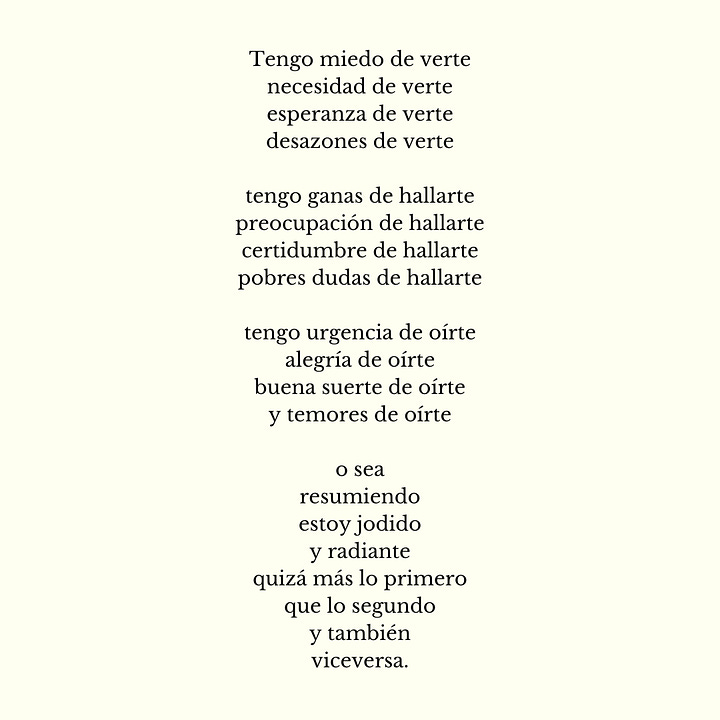
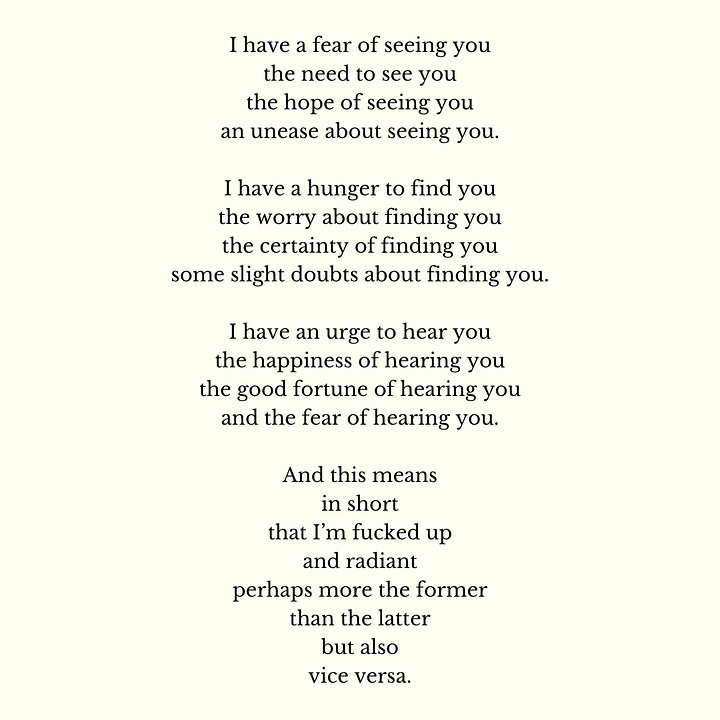
They also felt an obligation to capture the zeitgeist through words, cementing the role of the poet as a truth-teller, going into the dark corners of our society and shining a light. Neruda’s Poem 18 from his lost poems collection weaves the idea of everyone having something to return to as a common thread among all of humans.
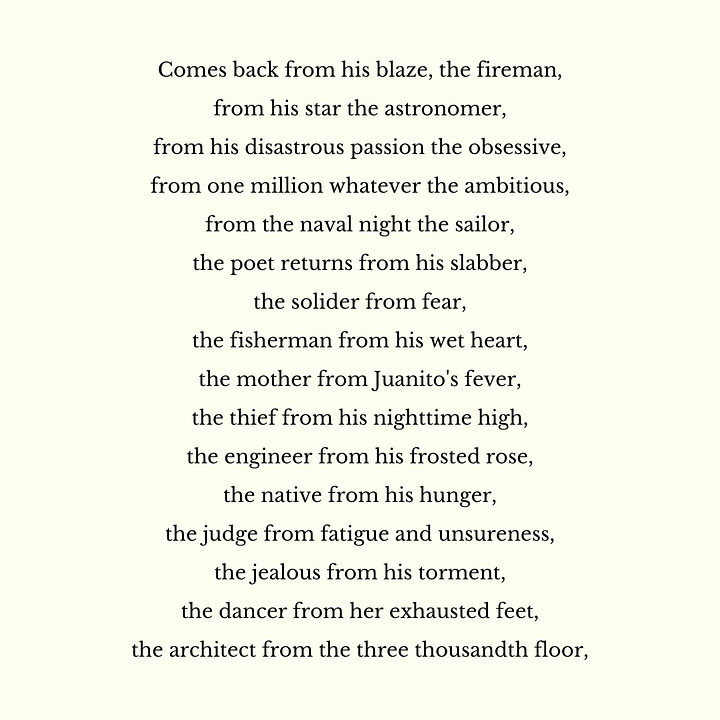
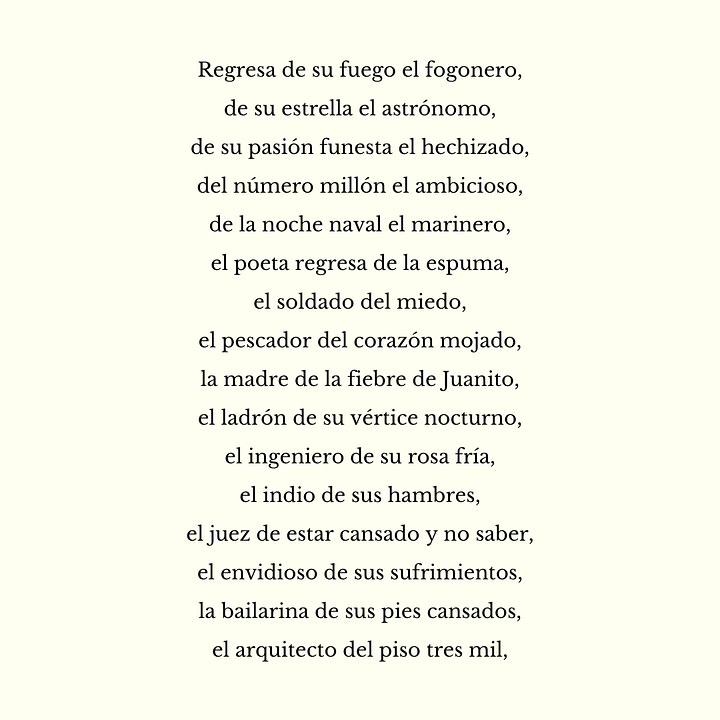
In college I learned about the Romantic English Poets (Lord Byron, William Blake, William Wordsworth, Samuel Taylor Coleridge, Percy B. Shelley, and John Keats). It was one of my favorite classes ever. I learned to break down poems, to see beneath the words and discover the universes living in syllables. I found an affinity with their Romanticism, their yearning to challenge convention and sterilizing rationality. For one of our assignments we were asked to write an essay deconstructing a poem. I chose Percy Bysshe Shelley’s Epipsychidion where I discovered what perhaps is my favorite stanza ever.
This influx of influences kept the flame of my poetry-writing burning throughout the years. All of a sudden, a few poems turned to a dozen, then multiple dozens, and now probably hundreds hiding within the margins of most notebooks in my bedroom.
Yet, the more I wrote the more I began asking myself: “Is my poetry any good?”
I do this thing where I grade every poem from 1-5 after I write it (5 being “amazing!”). Rarely have I given myself a score higher than a 3. Recently, I realized that this well-intended attempt at self-reflection was just building a bigger wall between me and sharing my poems. If I was scoring my poems so poorly, what chance did I have in the real world where everyone's a critic? Would it be worthwhile to share my poetry in the first place?
The broader tension I felt was the expectation of competence from having written poems for so long against the fact that very little of my poetry has been shared out of the fear of being humbled by the apathy of the masses. Imagine doing something for 15+ years and then discovering you are absolute rubbish.
Of course, this is neither the full story nor the most important thing about writing poems. I’ve lost the plot and my ego has led me astray.
I still struggle with this tension today. Thankfully, an experience a couple of years ago reminded me of the importance of writing and sharing my poetry.
Losing my Open Mic Virginity
It was early 2021, the point in the pandemic where we all had to learn the Greek Alphabet. Clubhouse5 fever was in full furor. There was a daily show called “Lullaby Club.” The premise was an hour full of songs, lullabies, and stories all sung/told in hushed tones, so as to not break the cardinal rule: “Don’t wake the baby!”
On Wednesdays, they hosted an open mic, where anyone with a voice and a hint of gumption could step into the virtual stage and be heard by a couple hundred sleepy dwellers. On a whim, I decided to sign up and lose my open mic virginity (albeit virtually, in the comfort of my home).
As my voice quivered and learned that my whispers are a few decibels too high to be qualified as whispers unanimously, I went onto read the following poem:
Waves (2014)
In your waves I play,
Sparring against the white foam
Letting you carry me
Towards the sand
The memories of my youth
To a nostalgia
Brought back to the present.
The children play,
Free of responsibility,
Guilt, worry,
And the parents drowning their view of paradise
With a beer and gossip magazines.
We forget the treasure of nature
By not playing with it
We forget the treasure of children
By not playing with them
And we forget the treasure of ourselves
By not feeling the sand
The sun
The miracle of life
And getting to play with the Waves.
I let out a deep sigh and immediately became hungry for any sign of approval in a forum where 1) I couldn’t see anyone’s face 2) The whole gist of it was to be as quiet as possible. I tried to give myself grace by telling myself “at least I did it.”
A day later, I got this message:
This is why we write. This is why we express ourselves. This is the point of all artistic creation. To make someone feel and experience something. To bring presence in their world, to see the beauty in the mundane, to add to the fabric of experiences which become core memories.
Harmony & Sharing the Gift
As I’ve realized that poetry is my primordial genre of expression, I’ve come to peace with the fact that in this life-long relationship, I will fall into doldrums that turn writing a simple rhyme into a strenuous task. Just as I will enjoy periods of time where creative genius will visit me bearing gifts (please, come more often).
Today, I’m less concerned about whether my poetry is “good” or not. Though, I would lie if I said I didn’t care at all. But any pursuit of acclamation misses the larger point–I write poems to bring harmony to all the identities within me. It gives voice to muted thoughts; nasty, naughty, nice, and negative. It defines the ineffable. It creates the indeleble in a world with no memory.
We all need to have some sort of creative expression, that not only fills us with life through the act of creation, but helps bring harmony to our inner selves.
From there on, it’s on me to share my poetry, so that it serves the world in some way. Perhaps by making visible to others what otherwise may be left unseen. Saying things with the utmost sincerity so they cut through the facades we live within. Bring expanded awareness through feeling or thought, or both. It’s on me to share this gift.
After all, this is what Sanz, Neruda, Benedetti, and The Romantic Poets all did for me. They’ve filled my life with wonder, with permission, with a mandate to follow their form and move others just as they have moved me.
Even if it’s just one person.
Media Worth Consuming
I got a Reiki Haircut by Olivia de Recat: The marvel of Olivia’s writing is how she can take something very mundane and use it as a window to a deeper introspection. In this introspection she gives us permission to explore our own dialogue; and thus, see that we are riddled by the same insecurity and fears. There is something comforting about kinship in weakness. It’s the first step towards healing.
Transparent Tuesdays Issue 161 by Charlie Bleecker: Charlie writes in a way that you know it’s absolutely her, but somehow her thoughts feel like our own inner monologue. Her conversation with Polina Marinova Pompliano turned into a lesson to press the record button, and the importance of giving ourselves grace. Oh, and the podcast episode is great as well.
Eye-contact electricity by Malavika Mudit: I blabber on to my friends about the importance of eye-contact, so this wonderful reflection by Malavika spoke to me. In her words: “What we say just doesn’t matter if we can make someone feel seen.”
Photo of the Week
These are some of my trusty moleskins that have been companions through many journeys and hold a big chunk of all my poems. I try to always have pen & paper with me (or diligently use Apple Notes). If you don’t have a note-taking practice, I recommend so. Catch your epiphanies! Your future self will thank you for it.
Until next time!
***Thank you to Steven Foster, Catalina Muñoz, Alex Michael, and Lavinia Losub for your help refining this piece.***
I have unintentionally attempted multiple sequels since.
This term was coined by Ellen Fishbein. She contends that poems pre-date the written word. They started out as songs. The development of the written word emerged, along with other factors, out of the need to transcribe song lyrics. Additionally, Ellen claims “Poetry was integral to their pursuit of excellence in writing. By practicing it, they were getting down to the roots of writing.”
It was definitely a high school crush.
If anyone born past 2000 is reading this, a Discman was this thing you used to put CDs on and listen to them. It was clunky. But it was a flex at the time, trust me.
Clubhouse is an audio-based social networking app that allows users to participate in audio chat rooms with other users from around the world. It was big during the pandemic since people were nested in their homes starved of social interaction.



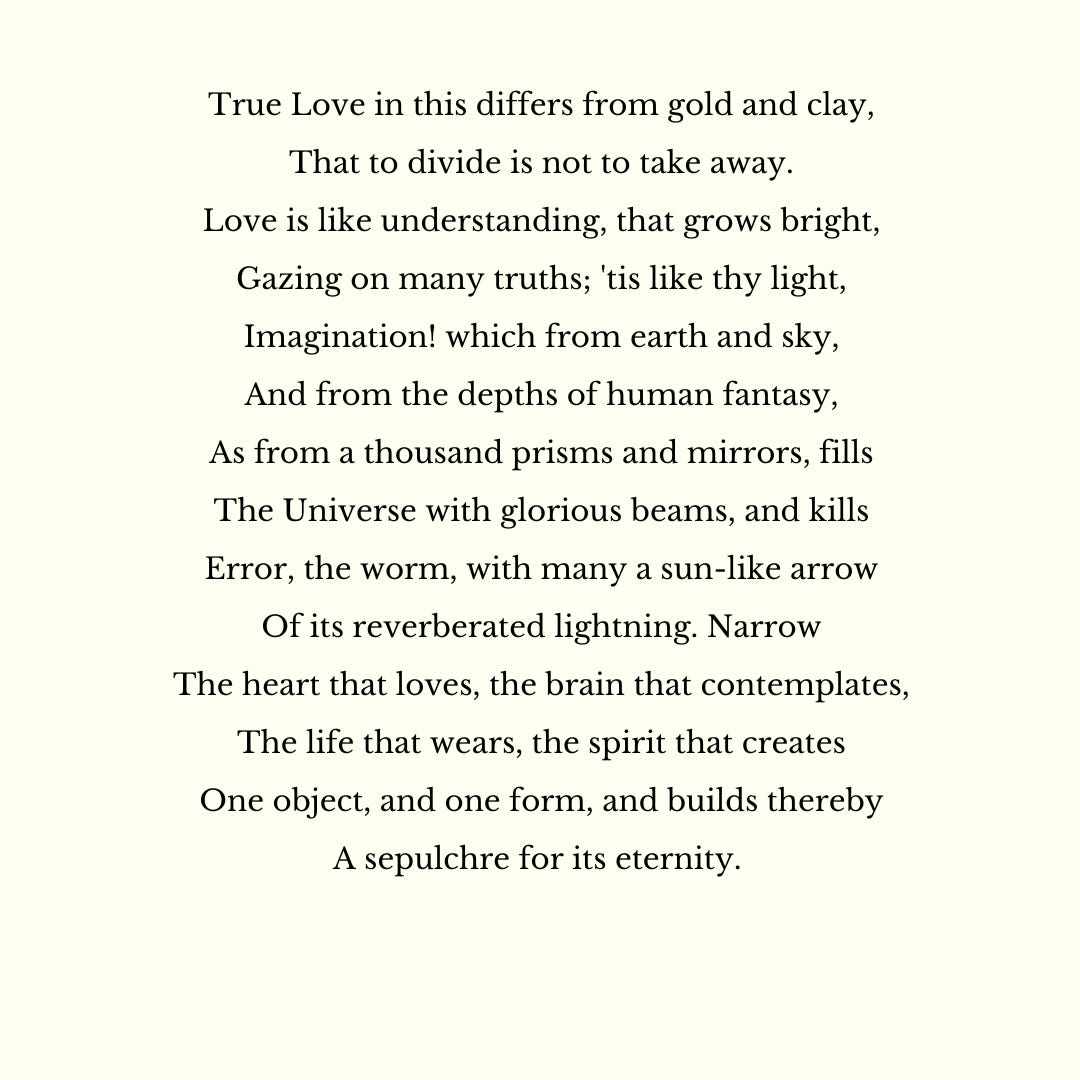


I lol'd at footnote #1 and Discman Flex.
I love this: "It was ok to feel deeply (especially as a man), it was “normal” to profess love, it was necessary to take what was in your heart and put it on paper."
So awesome that you shared your poem on an open mic and received a sweet note from a stranger. It's always something I've imagined doing but have never taken the steps to do so. You inspire me!
Camilo,
What a lovely detour through your own and your favorite poetry. I remember my 15 year old self disliking poetry, and now my nearly 40 year old self realizing how lost I was back then. Your writing here holds so much strength, especially as I've learned to love poetry recently through Neruda and Keats.